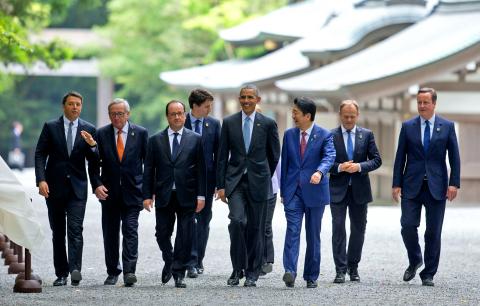G7 leaders yesterday agreed on the need to send a strong message on maritime claims in the western Pacific, where an increasingly assertive China is locked in territorial disputes with Japan and several Southeast Asian nations.
The agreement prompted a sharp rejoinder from China, which is not in the G7 club, but whose rise as a power has put it at the heart of some discussions at the advanced nations’ summit in Ise-Shima.
“Prime Minister [Shinzo] Abe led discussion on the current situation in the South China Sea and East China Sea. Other G7 leaders said it is necessary for G7 to issue a clear signal,” Japanese Deputy Chief Cabinet Secretary Hiroshige Seko told reporters after a session on foreign policy affairs.

Photo: Reuters
However, in Beijing, Chinese Ministry of Foreign Affairs spokeswoman Hua Chunying (華春瑩) said that the South China Sea issue had “nothing to do” with the G7 or any of its members.
“China is resolutely opposed to individual countries hyping up the South China Sea for personal gain,” she said.
US President Barack Obama yesterday pointed to the risks from North Korea’s nuclear and missile programs, saying the isolated state was “hell bent” on getting atomic weapons, but there had been improved responses from countries in the region like China that could reduce the risk of the North selling weapons or nuclear material.
“It’s something that we’ve put at the center of discussions and negotiations with China,” Obama told reporters.
The global economy topped the agenda earlier in the day, when G7 leaders voiced concern about emerging economies and Abe made a pointed comparison to the 2008 global financial crisis. Not all his G7 partners appeared to agree.
The G7 leaders did agree on the need for flexible spending to spur world growth, but the timing and amount depended on each country, Seko told reporters, adding some countries saw no need for such spending.
Britain and Germany have been resisting calls for fiscal stimulus.
“G7 leaders voiced the view that emerging economies are in a severe situation, although there were views that the current economic situation is not a crisis,” Seko said.
Abe presented data showing global commodities prices fell 55 percent from June 2014 to January this year, the same margin as from July 2008 to February 2009, after the Lehman collapse.
Lehman had been Wall Street’s fourth-largest investment bank when it filed for Chapter 11 protection on Sept. 15, 2008, making its bankruptcy by far the biggest in US history. Its failure triggered the global financial crisis.
Abe hopes, some political insiders say, to use a G7 statement on the global economy as cover for a domestic fiscal package including the possible delay of a rise in the nation’s sales tax to 10 percent from 8 percent planned for April next year.
Obama also ripped into Republican presidential hopeful Donald Trump, saying the billionaire had rattled other G7 leaders and that his statements were aimed at getting headlines, not what was needed to keep the US safe and the world on an even keel.
Summit pageantry began when Abe escorted G7 leaders to the Shinto religion’s holiest site, the Ise Grand Shrine in central Japan, dedicated to sun goddess Amaterasu Omikami, mythical ancestress of the Japanese emperor.

The Taiwanese passport ranked 33rd in a global listing of passports by convenience this month, rising three places from last month’s ranking, but matching its position in January last year. The Henley Passport Index, an international ranking of passports by the number of designations its holder can travel to without a visa, showed that the Taiwan passport enables holders to travel to 139 countries and territories without a visa. Singapore’s passport was ranked the most powerful with visa-free access to 192 destinations out of 227, according to the index published on Tuesday by UK-based migration investment consultancy firm Henley and Partners. Japan’s and

NATIONAL SECURITY THREAT: An official said that Guan Guan’s comments had gone beyond the threshold of free speech, as she advocated for the destruction of the ROC China-born media influencer Guan Guan’s (關關) residency permit has been revoked for repeatedly posting pro-China content that threatens national security, the National Immigration Agency said yesterday. Guan Guan has said many controversial things in her videos posted to Douyin (抖音), including “the red flag will soon be painted all over Taiwan” and “Taiwan is an inseparable part of China,” while expressing hope for expedited “reunification.” The agency received multiple reports alleging that Guan Guan had advocated for armed reunification last year. After investigating, the agency last month issued a notice requiring her to appear and account for her actions. Guan Guan appeared as required,

Japan and the Philippines yesterday signed a defense pact that would allow the tax-free provision of ammunition, fuel, food and other necessities when their forces stage joint training to boost deterrence against China’s growing aggression in the region and to bolster their preparation for natural disasters. Japan has faced increasing political, trade and security tensions with China, which was angered by Japanese Prime Minister Sanae Takaichi’s remark that a Chinese attack on Taiwan would be a survival-threatening situation for Japan, triggering a military response. Japan and the Philippines have also had separate territorial conflicts with Beijing in the East and South China

A strong cold air mass is expected to arrive tonight, bringing a change in weather and a drop in temperature, the Central Weather Administration (CWA) said. The coldest time would be early on Thursday morning, with temperatures in some areas dipping as low as 8°C, it said. Daytime highs yesterday were 22°C to 24°C in northern and eastern Taiwan, and about 25°C to 28°C in the central and southern regions, it said. However, nighttime lows would dip to about 15°C to 16°C in central and northern Taiwan as well as the northeast, and 17°C to 19°C elsewhere, it said. Tropical Storm Nokaen, currently